Discover Short Wave
Short Wave

Short Wave
Author: NPR
Subscribed: 25,643Played: 3,048,868Subscribe
Share
© Copyright 2019-2025 NPR - For Personal Use Only
Description
New discoveries, everyday mysteries, and the science behind the headlines — in just under 15 minutes. It's science for everyone, using a lot of creativity and a little humor. Join hosts Emily Kwong and Regina Barber for science on a different wavelength.
If you're hooked, try Short Wave Plus. Your subscription supports the show and unlocks a sponsor-free feed. Learn more at plus.npr.org/shortwave
If you're hooked, try Short Wave Plus. Your subscription supports the show and unlocks a sponsor-free feed. Learn more at plus.npr.org/shortwave
1499 Episodes
Reverse
This past weekend, Winter Storm Fern struck the States. Sleet, snow and ice battered Americans all the way from New Mexico to New York. Scientists predicted its arrival in mid-January, and in anticipation of the storm, more than 20 state governors issued emergency declarations. But how did scientists know so much, so early, about the approaching storm? NPR climate reporter Rebecca Hersher says it has to do with our weather models… and the data we put into them. Which begs the question: Will we continue to invest in them?Interested in more science behind the weather? Check out our episodes on better storm prediction in the tropics and how the Santa Ana winds impact the fire season this time of year. Have a question we haven’t covered? Email us at shortwave@npr.org. We’d love to consider it for a future episode! Listen to every episode of Short Wave sponsor-free and support our work at NPR by signing up for Short Wave+ at plus.npr.org/shortwave.This episode was produced by Hannah Chinn. It was edited by our showrunner Rebecca Ramirez. Tyler Jones and Rebecca Hersher checked the facts. The audio engineer was Robert Rodriguez. News clips were from CBS Boston, Fox Weather, Fox 4 Dallas-Fort Worth, and PBS Newshour.Learn more about sponsor message choices: podcastchoices.com/adchoicesNPR Privacy Policy
Listener Shabnam Khan has a problem: Every time she works in her garden, she’s visited by lizards and frogs. Shabnam has lived in the metro Atlanta area for decades, and she says this number of scaly, clammy visitors has exploded over the past few years. Frogs croak at night; lizards sun on the cement. And she wants to know, where did all of these animals come from? It turns out, there are a number of potential answers – from small-scale environmental changes like natural plants and new water sources to large-scale shifts like urbanization and development displacing local wildlife. On this month’s Nature Quest, host Emily Kwong and producer Hannah Chinn discuss the possibilities – and impacts – of these changes.If you live in the Atlanta area and are interested in volunteering with MAAMP (the Metro Atlanta Amphibian Monitoring Program), you can sign up for training here.This episode is part of Nature Quest, our monthly segment that brings you a question from a fellow listener who is noticing a change in the world around them.Send a voice memo to shortwave@npr.org telling us your name, location and a question about a change you’re seeing in nature – it could be our next Nature Quest episode!Listen to every episode of Short Wave sponsor-free and support our work at NPR by signing up for Short Wave+ at plus.npr.org/shortwave.Learn more about sponsor message choices: podcastchoices.com/adchoicesNPR Privacy Policy
There’s an ongoing, near-total blackout of the internet in Iran. The shutdown is part of a response by the government to ongoing protests against rising inflation and the value of the nation’s currency plummeting. Since protests began more than two weeks ago, only an estimated 3% of Iranians have stayed online through the satellite internet system Starlink. Doing so is a crime. So, today on the show: Iran offline. We get into how the internet works, how a government can shut it down and how scientists are monitoring the nation’s connectivity from afar.
Check out more of NPR's coverage of Iran: - Iran Protests Explained- There's an internet blackout in Iran. How are videos and images getting out?- Iran blocked the internet amid deadly protests. Some voices are still getting throughInterested in more science behind the headlines? Email us your question at shortwave@npr.org – we may tackle it in a future episode!Listen to every episode of Short Wave sponsor-free and support our work at NPR by signing up for Short Wave+ at plus.npr.org/shortwave.This episode was produced by Berly McCoy, edited by Rebecca Ramirez and fact checked by Tyler Jones. Robert Rodriguez was the audio engineer.Learn more about sponsor message choices: podcastchoices.com/adchoicesNPR Privacy Policy
A new study shows penguins are breeding earlier than ever in the Antarctic Peninsula. This region is one of the fastest-warming areas of the world due to climate change, and penguins time their breeding period to environmental conditions. That’s everything from the temperature outside and whether there’s ice on the ground to what food is available. Changes in those conditions could contribute to mating changes. Plus, answers to a debate about how ice melts and how dirty diapers train parents in the art of disgust. Have a scientific question you want us to answer? Email us at shortwave@npr.org.Listen to every episode of Short Wave sponsor-free and support our work at NPR by signing up for Short Wave+ at plus.npr.org/shortwave.Listen to Short Wave on Spotify and Apple Podcasts. This episode was produced by Jason Fuller and Rachel Carlson. It was edited by Rebecca Ramirez and Christopher Intagliata. Tyler Jones checked the facts. The audio engineers were Kwesi Lee and Hannah Gluvna.Learn more about sponsor message choices: podcastchoices.com/adchoicesNPR Privacy Policy
Cloud 9 is a failed galaxy. It’s a clump of dark matter, called a dark matter halo, that never formed stars. But this failure could be the key to a mystery almost as old as the universe itself: dark matter. Scientists don’t know what dark matter is, but Cloud 9 could offer new clues. Three researchers weigh in on this new discovery and why it could be a missing piece to the story on how the universe formed.Check out our episode with astrophysicist Jorge Moreno on the mysterious Great Attractor and our summer series on space. Have a scientific question you want us to answer? Email us at shortwave@npr.org.Learn more about sponsor message choices: podcastchoices.com/adchoicesNPR Privacy Policy
Medical drama The Pitt is winning Golden Globes… and health care workers’ hearts. Medical experts say the show, which chronicles a fictional Pittsburgh hospital emergency department, is perhaps the most medically accurate show that’s ever been created. But what about The Pitt makes it so accurate… and does the second season hold up as well as the first? Stanford Global Health Media Fellow (and fourth-year medical school student) Michal Ruprecht joins Short Wave to discuss.Have a question about YOUR favorite show and whether science supports it? Email us at shortwave@npr.org.Listen to every episode of Short Wave sponsor-free and support our work at NPR by signing up for Short Wave+ at plus.npr.org/shortwave.This episode was produced by Hannah Chinn. It was edited by Rebecca Ramirez. Tyler Jones checked the facts. The audio engineer was Maggie Luthar.Learn more about sponsor message choices: podcastchoices.com/adchoicesNPR Privacy Policy
In today's episode, host Emily Kwong leads us on a night hike in Patuxent River State Park in Maryland. Alongside a group of naturalists led by Serenella Linares, we'll meet a variety of species with unique survival quirks and wintertime adaptations. We'll search out lichen that change color under UV light and flip over a wet log to track a salamander keeping warm under wet leaves. Emily may even meet the bioluminescent mushrooms of her dreams. Plus, we talk about community events to get outside, such as the City Nature Challenge and Great American Campout.Do you have a question about changes in your local environment? Email a recording of your question to shortwave@npr.org — we may investigate it as part of an upcoming Nature Quest segment!Listen to every episode of Short Wave sponsor-free and support our work at NPR by signing up for Short Wave+ at plus.npr.org/shortwave.Learn more about sponsor message choices: podcastchoices.com/adchoicesNPR Privacy Policy
Wanna know where tech is headed this year? MIT Technology Review has answers. They compile an annual list called "10 Breakthrough Technologies". Today, host Regina G. Barber speaks with executive editor Amy Nordrum about the list, and they get into everything from commercial space stations and base-edited babies to batteries that could make electric vehicles even more green. We also do a lightning round of honorable mentions you won't want to miss out on!Check out the full list from MIT Technology Review.Interested in more science? Check out our episode on last year’s top 10 technologies to watch and our episode on building structures in space.Email us your questions at shortwave@npr.org.Listen to every episode of Short Wave sponsor-free and support our work at NPR by signing up for Short Wave+ at plus.npr.org/shortwave.This episode was produced by Berly McCoy. It was edited and fact-checked by Rebecca Ramirez. The audio engineer was Robert Rodriguez.Learn more about sponsor message choices: podcastchoices.com/adchoicesNPR Privacy Policy
There’s this idea that something happens in the human brain when we turn 25. Suddenly, we can rent a car without fees. Make rational decisions. We may even regret some of our past… indiscretions. All because we’re developed…right? Well, a recent paper in the journal Nature suggests that may not be the case. Neuroscientists found four distinct turning points in brain development across the human lifespan – and that the brain may be in its “adolescent” phase until about the age of 32. Interested in more of the science inside your brain? Email us your question at shortwave@npr.org.Listen to every episode of Short Wave sponsor-free and support our work at NPR by signing up for Short Wave+ at plus.npr.org/shortwave.This episode was produced by Rachel Carlson. It was edited by Rebecca Ramirez. Tyler Jones checked the facts. The audio engineer was Kwesi Lee.Learn more about sponsor message choices: podcastchoices.com/adchoicesNPR Privacy Policy
In the mid-1980s, scientists published a startling finding–a giant hole in the ozone layer over Antarctica. That’s the protective shield that blocks large amounts of harmful UV radiation. And without it, the rate of cancer, cataracts and crop failure would skyrocket. Today on the show, we dive into ozone science and examine how scientists successfully sounded the alarm and solved an Antarctic mystery.Check out our episode on an Antarctic plankton mystery. And, listen to our monthly series Nature Quest.Interested in more atmospheric science? Email us your question at shortwave@npr.org.Listen to every episode of Short Wave sponsor-free and support our work at NPR by signing up for Short Wave+ at plus.npr.org/shortwave.This episode was produced by Berly McCoy. It was edited by Rebecca Ramirez. Tyler Jones checked the facts. The audio engineer was Becky Brown.Learn more about sponsor message choices: podcastchoices.com/adchoicesNPR Privacy Policy
Microbes are little alchemists that perform all manner of chemical reactions. A team of microbiologists co-founded a non-profit to try to harness those abilities to solve some of the world’s big problems — from carbon capture to helping coral reefs to cleaning up waste. Recently, the team turned their attention to the microbes living in people’s homes — on and in shower heads, drip pans, and hot water heaters. These rather extreme environments may have pressured microorganisms into surviving in ways that could be advantageous to humans. Science reporter Ari Daniel takes us on a treasure hunt in miniature.This episode was produced by Hannah Chinn. It was edited by Rebecca Ramirez. Tyler Jones checked the facts. The audio engineer was Robert Rodriguez.Interested in learning more about the weird and wonderful world of microbes? Email us your question at shortwave@npr.org.Listen to every episode of Short Wave sponsor-free and support our work at NPR by signing up for Short Wave+ at plus.npr.org/shortwave.Learn more about sponsor message choices: podcastchoices.com/adchoicesNPR Privacy Policy
Most astronomers agree that young galaxy clusters should be relatively cool compared to older ones. But researchers recently found a very young cluster that’s hotter than the surface of the sun. More on why the finding is so shocking, plus elephant’s remarkable sniffing abilities and a new discovery about butterfly migration in this episode of Short Wave. Interested in more science news? Email us your question at shortwave@npr.org.Listen to every episode of Short Wave sponsor-free and support our work at NPR by signing up for Short Wave+ at plus.npr.org/shortwave.Learn more about sponsor message choices: podcastchoices.com/adchoicesNPR Privacy Policy
Healthy forests help combat climate change, provide humans with drinking water and even improve mental and physical health. But it’s hard to imagine an entire forest in the middle of a big city. That’s where micro-forests come into play — public forests on a smaller scale, filled with native plants. They exist around the world, and producer Rachel Carlson went to visit the largest micro-forest in California. She joins host Emily Kwong to chat about what she saw. Interested in more of the science behind urban nature? Email us your question at shortwave@npr.org.Listen to every episode of Short Wave sponsor-free and support our work at NPR by signing up for Short Wave+ at plus.npr.org/shortwave.Learn more about sponsor message choices: podcastchoices.com/adchoicesNPR Privacy Policy
What happens behind the scenes of a dinosaur exhibit? Short Wave host Regina Barber got to find out … by taking a trip to the Carnegie Museum of Natural History in Pittsburgh. In the museum’s basement, she talked to a paleobiologist, checked out a farmland fossil find and even touched a 67 million-year-old bone. Because, as it turns out, there’s a lot of science that can be found in a museum basement.Learn more about the Carnegie Museum of Natural History’s exhibit “The Stories We Keep”.Interested in more archaeology and dino-related science? Email us your question at shortwave@npr.org.Listen to every episode of Short Wave sponsor-free and support our work at NPR by signing up for Short Wave+ at plus.npr.org/shortwave.Learn more about sponsor message choices: podcastchoices.com/adchoicesNPR Privacy Policy
Choose your fighter for the origin of water on Earth! Was it always here or did it come to this planet from somewhere else in space? And, either way, what does this mean for other water worlds in our galaxy? To find out, we talk with Michael Wong, an astrobiologist and planetary scientist at Carnegie Science. He gets into scientists’ strongest candidates for the ways water could have come to our planet many, many years ago – including whether it could have been made here. Buckle up: This is a hot debate in astrobiology right now.If you enjoyed this episode, check out our Space Camp series and our episode on whether life started on the ocean floor..Interested in more space science and more unresolved hypotheses about how the universe came to be how it is today? Email us your question at shortwave@npr.org.Listen to every episode of Short Wave sponsor-free and support our work at NPR by signing up for Short Wave+ at plus.npr.org/shortwave.Learn more about sponsor message choices: podcastchoices.com/adchoicesNPR Privacy Policy
What better time to contemplate the conundrum that is zero than the start of a new year? Zero is a fairly new concept in human history and even more recent as a number. It wasn't until around the 7th century that zero was used as a number. That's when it showed up in the records of Indian mathematicians. Since then, zero has, at times, been met with some fear — at one point the city of Florence, Italy banned the number.Today, scientists seek to understand how much humans truly comprehend zero — and why it seems to be different from other numbers. That's how we ended up talking to science writer Yasemin Saplakoglu in this encore episode about the neuroscience of this number that means nothing.Read more of Yasemin's reporting on zero for Quanta Magazine. Plus, check out our episode on why big numbers break our brains.Interested in more math episodes? Let us know what kind of stories you want to hear from us in 2026 by emailing shortwave@npr.org!Listen to every episode of Short Wave sponsor-free and support our work at NPR by signing up for Short Wave+ at plus.npr.org/shortwave.Learn more about sponsor message choices: podcastchoices.com/adchoicesNPR Privacy Policy
Science in the United States took some big hits this year. The Trump Administration disrupted federal funding for all kinds of scientific pursuits. Administration officials say those changes were a step towards reinvigorating federal agencies like the National Institutes of Health. But many scientists disagree. NPR health and science correspondents Rob Stein and Katia Riddle chat with host Emily Kwong about what these cuts could mean for the future of science.Interested in more stories on the future of science? Email us your question at shortwave@npr.org.Listen to every episode of Short Wave sponsor-free and support our work at NPR by signing up for Short Wave+ at plus.npr.org/shortwave.Learn more about sponsor message choices: podcastchoices.com/adchoicesNPR Privacy Policy
Gen Z and younger millennials are generally the most climate literate generations. As an age cohort that started learning about climate change in school, they're worried about how to plan for their future jobs, houses and, yes, kids. With climate-related disasters and global warming likely to worsen, climate anxiety is giving way to reproductive anxiety. So, what do experts say about how to navigate the kid question?On this encore episode of Nature Quest, Short Wave speaks to Alessandra Ram, a journalist covering climate change, who just had a kid. We get into the future she sees for her newborn daughter and ask, how do we raise the next generation in a way that's good for the planet?Here are the resources recommended by the experts we interviewed for this story:Action Tools and Community ResourcesThe High-Impact Climate Action Guide by Kimberly A. NicholasThe Climate Mental Health Network and Climate Emotions WheelThe Climate Café® Hub - for finding a local groupBooks and Research PapersClimate Anxiety and the Kid Question: Deciding Whether to Have Children in an Uncertain Future, by Jade S. SasserParenting in a Changing Climate: Tools for cultivating resilience, taking action, and practicing hope in the face of climate change, by Elizabeth BechardUnder the Sky We Make: How to Be Human in a Warming World, by Kimberly A. NicholasThe role of high-socioeconomic-status people in locking in or rapidly reducing energy-driven greenhouse gas emissions, Nielsen, K.S., Nicholas, K.A., Creutzig, F. et al. Got a question about changes in your local environment? Send a voice memo to shortwave@npr.org with your name, where you live and your question. You might make it into our next Nature Quest episode!Listen to every episode of Short Wave sponsor-free and support our work at NPR by signing up for Short Wave+ at plus.npr.org/shortwave.Learn more about sponsor message choices: podcastchoices.com/adchoicesNPR Privacy Policy
Kratom and 7-OH products are available in many smoke shops. But earlier this year, the FDA recommended certain 7-OH products be scheduled alongside opioids. This isn’t the first time kratom has come under scrutiny. Nearly a decade ago, the DEA wanted to make certain active ingredients in kratom controlled substances. Meaning products would go from being widely available to highly restricted. After a massive wave of protest, the DEA decided not to move forward. Producer Rachel Carlson joins host Emily Kwong to talk about what could happen this time around, and what scientists know – and don’t know – about kratom and 7-OH. Interested in more of the science behind drugs and supplements? Email us your question at shortwave@npr.org.Listen to every episode of Short Wave sponsor-free and support our work at NPR by signing up for Short Wave+ at plus.npr.org/shortwave.Learn more about sponsor message choices: podcastchoices.com/adchoicesNPR Privacy Policy
Scientists in the Arctic are catching the exhaled breaths of whales to better understand their health. How? Drones. Whales breathe through their blowholes, which are the equivalent of nostrils on their heads. By studying the microbes in exhaled whale breaths, scientists are piecing together how deadly diseases spread in whale populations. Host Emily Kwong and producer Berly McCoy talk to All Things Considered host Juana Summers about what scientists can do with this information, from reducing stress on whales and monitoring ocean health to warning people who could be in close proximity to whales carrying zoonotic diseases. Interested in more science on charismatic megafauna? Email us your question at shortwave@npr.org.Listen to every episode of Short Wave sponsor-free and support our work at NPR by signing up for Short Wave+ at plus.npr.org/shortwave.Learn more about sponsor message choices: podcastchoices.com/adchoicesNPR Privacy Policy

























..so, yeah.. THiS!!!...but...Abt.🐈😺 doing the same thing!?! please 🙏 & thank you!
I love it when I have lucid dreams. I learned to have them by accident. As a kid, I would remember a dream I liked and wrote it down before I forgot. I did this often enough that, apparently, I taught myself to be aware in my dreams. The first time I remember being able to control my dreams was at the start of a nightmare. I knew a vampire was going to come through a doorway in front of me, and I mentally shouted, "No!" A slammed shur door appeared in my dream, stopping the vampire.
Love, love, love your content. You are my Saturday morning binge.
I love Short Wave! Thank you for the plethora of diverse topics and thorough reporting!
It would be nice to see this fixed. Reupload please? 🙏
This is the frog episode again at the moment
Wow-wow-wow! Don't talk over each other!? Editor, can the upload be fixed?
Originally posted on 1/24/2019 {23 days after New Year '19}
Great podcasr.
@10:35 "...for the cannabinoids..." OK, so did the strains with different smells manage to keep similar levels of strength? Because when you have that, consumers can start selecting on the basis of smells and flavours.
The movie "Longitude" is a beautiful frustrating movie, about the competition to create these marine clocks.
Sadly the drugs can only slow it down but the end is still the inevitable fate. Lifetime medication because the disease will just keep emerging again.
Well whats the other levels of infinity?? lol was hoping they would have covered that after dropping the new info (to me) that infinity is not Just infinity)
ALL>FUL>MOVIES>LINK👉https://co.fastmovies.org
OMG, thanks for talking about this! I hate LEDs flicker AND over-brighteness! ESPECIALLY in cars!!! DANGEROUS!!!
It makes sense that they would be afraid of larger more dangerous versions of spiders. I'd be afraid of a giant humanoid too at first.
where can I find the transcript?
They're talking about levees breaking and not one American pie joke, in so disappointed.
i want the links promised!
love most of the shows but this one desperately needed links to the images being discussed.